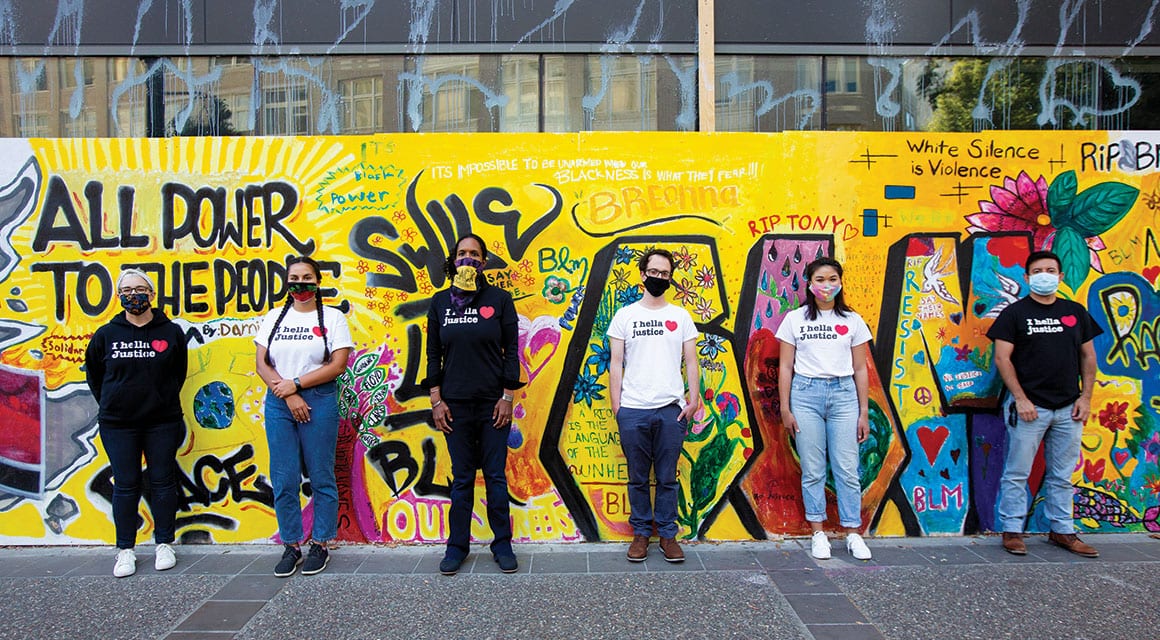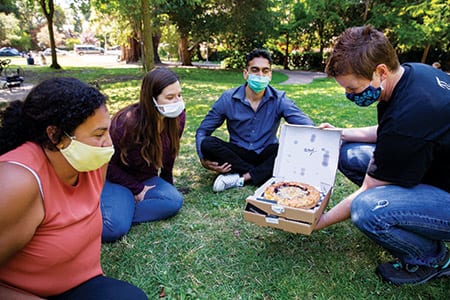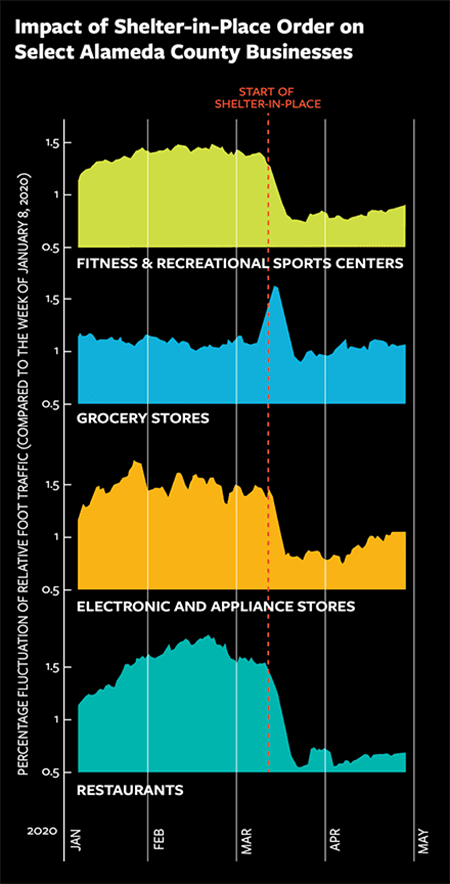
When the pandemic rained havoc on every sector of society, Berkeley Law students and faculty immediately jumped in to help.
By Gwyneth K. Shaw
Evangeline McKilligan was close to opening her dream business — a bespoke bakery in Richmond — when the COVID-19 pandemic upended her plans. Almost overnight, the critical help she’d been getting from Berkeley Law’s New Business Community Law Clinic became a lifeline.
“The clinic has just been amazing,” says McKilligan, who was in her fourth month of selling pies, cookies, and breads through her business, The BakerE, and looking for a brick-and-mortar storefront when she was forced to change direction.
With the clinic’s help, The BakerE has survived and pivoted, sticking with takeout and delivery from the cottage food operation kitchen at McKilligan’s home. Her quest for a physical shop continues, but at a smaller scale and with an eye on the wholesale market.
“Having the clinic’s help, and advice as a sounding board, was very important,” she says. “Being a small business just starting out, having it be free was huge to me.”
The pandemic created endless challenges across a broad swath of society. Health care systems strained, the economy staggered, and the legal system labored to keep pace amid widespread closures. Berkeley Law’s students and faculty — already faced with the difficulty of shifting to remote learning and teaching — immediately leaped in to help with countless hours of pro bono work.
As the weeks have stretched into months, those efforts have only intensified.
“One of the things that most makes Berkeley Law special is its public mission and its strong pro bono culture, with virtually every student doing pro bono work throughout law school,” Dean Erwin Chemerinsky says. “I have been thrilled and very proud to see so many of our students and faculty doing this work to help those who have legal issues because of COVID-19.
“This is truly Berkeley Law at its best.”
Survival guide
William Kell, director of the New Business Community Law Clinic, immediately recognized that businesses it serves would need a special kind of help. Clinical staff and students have been giving advice and assistance on such things as interpreting California’s guidance for which businesses can legally be open and how to wisely unwind a company that can’t survive the pandemic.
“There was a significant portion of small businesses that were just stunned and didn’t know what to do,” Kell says.
Early help focused on navigating the initial crisis and applying for assistance through the federal CARES Act, which included the $350 billion Paycheck Protection Plan, offering low-interest, partially forgivable loans to help small businesses keep employees on their payrolls.

The Berkeley Center for Law and Business also jumped in to assist entrepreneurs in navigating the aid program. Professor Robert Bartlett, a center faculty co-director who once represented startup companies, posted videos and a written breakdown of what every small-business owner should know.
Students in his Corporate Finance class wanted to get involved, too, so the center began matching students and volunteer lawyers to small businesses seeking help with federal and local stimulus programs. By midsummer, the initiative had worked with nearly 400 businesses and recruited 63 lawyers.
“Helping companies solve cash-flow challenges is at the heart of corporate finance,” Bartlett says. “So it’s a great opportunity for students to learn while helping small businesses weather the storm.”
Powerful pivot
When the pandemic shuttered Berkeley Law in March, Pro Bono Program Director Deborah Schlosberg immediately reached out to the school’s community partners to see how students could be of service. She then helped connect students with pro bono needs through a listserv for interested students, staff, and faculty that reaches more than 600 members of the school community.
For students involved in the Workers’ Rights Clinic, one of the Pro Bono Program’s three dozen Student-Initiated Legal Services Projects, the pandemic dramatically increased their workload. Jasjit Mundh ’21, one of the project’s directors, says the group held multiple sessions via Zoom each week under the supervision of Legal Aid at Work, a San Francisco-based nonprofit.
The project, which advises Legal Aid at Work’s low-income clients, has served more than 750 people since COVID-19 hit, Mundh says. The pandemic puts tremendous pressure on lowwage workers, many of whom are employed in health care and other sectors deemed “essential” to respond to the crisis.
“One thing COVID has shown is that frontline workers, often those who are underpaid and exploited for the hard work they do, are the foundation of society. And the majority of these folks are people of color,” she says. “We’ve been able to help provide much-needed legal advice about navigating work safety and other issues, including privacy and health violations and race discrimination at work.”
For those suddenly out of a job, the Workers’ Rights Clinic helped with access to unemployment benefits, particularly for undocumented workers.
“Our work has not fundamentally changed, but the volume of clients needing assistance has definitely increased,” says Drea Núñez ’20. “As a native Spanish speaker, I really felt like I could not take any weeks off because there are so few Spanish speakers in the legal profession, but so many monolingual Spanish speakers that need help.”
Núñez says her advocacy work was a powerful reminder of what she wants to be as a lawyer, giving her a highlight amid heightened anxiety about finishing law school and studying for the bar exam.
Mundh says her work with the clinic “means everything.”
“I was raised in a low-income, single-parent household and often witnessed my mother and community members be at the mercy of their employers. I came to law school to help play some role in leveling the playing field between those who have power and those who will someday obtain it,” she says. “By volunteering during a time of worldwide uncertainty, I feel like I’ve been able to use my degree to simplify complex systems and help the most vulnerable — which is exactly why I wanted to go to law school in the first place.”
New problem, new advocacy
The Pro Bono Program matched other students with the ACLU of Northern California and the San Francisco Public Defender’s Office in an effort to free undocumented immigrants from detention by U.S. Immigration and Customs Enforcement (ICE) while the spread of COVID-19 remains a threat. Among the lawyers the students worked with are public defender Genna Beier ’14 and ACLU attorney Angélica Salceda ’13.
So far, more than 100 detainees have been released under an order from U.S. District Court Judge Vince Chhabria ’98 to enable social distancing inside two California detention centers, and their population has been reduced by more than 50%.
“I’m proud to see the students’ commitment to fighting for justice,” Beier says.
After training via Zoom, the students worked two-hour shifts taking calls from detainees, collecting personal information and documenting the conditions inside the centers.
Francesco Arreaga ’21 recalls talking with detainees who reported appalling conditions, especially considering how easily the coronavirus can spread: No soap. Dirty food trays. Little to no enforcement of social distancing and mask mandates. Failure to isolate new detainees as they were brought in.
“Every time people called, they described the harrowing conditions they were living in during the pandemic and expressed how grateful they were to know that there are people working to help them,” Arreaga says. “Each time I ended a call I felt sad, because it reminded me of how rigged our immigration system is and how so many people are suffering as a result.
“It fortified my determination to work for systemic change in our country so that we can live in a society that respects human rights.”
The bulk of the volunteer effort happened around final exams in early May. Even so, Danielle Elliott ’22 says she felt it was too urgent and too important to skip.
 “The work to dismantle ICE is far from over. But this creative approach of using COVID as a means to highlight the hazardous, illegal conditions inside detention centers and as a legal reason to release detainees is exactly the type of legal ingenuity I hoped to gain at Berkeley Law,” she says. “I’m proud to have worked on this case.”
“The work to dismantle ICE is far from over. But this creative approach of using COVID as a means to highlight the hazardous, illegal conditions inside detention centers and as a legal reason to release detainees is exactly the type of legal ingenuity I hoped to gain at Berkeley Law,” she says. “I’m proud to have worked on this case.”
Helping keep businesses afloat
The economic fallout from the pandemic remains extreme. In a new working paper, Bartlett and Adair Morse of the UC Berkeley Haas School of Business illustrate how foot traffic into Alameda County businesses, including grocery stores and restaurants, cratered when the shelter-in-place orders hit. Even with some reopening, those sectors haven’t recovered, they show (see graphic, left).
Using survey data from Oakland businesses, they also find that “microbusinesses” with five or fewer employees had a better chance to survive because of the government loan program and more generous unemployment benefits, but that boost was less useful for larger businesses. The paper fits into a growing body of scholarship on the economics of the pandemic and the implications for policymakers who are trying to mitigate long-term damage.
Over late spring and into summer, as businesses began to get permission from the state to reopen, Kell realized small companies needed guidance on how to do so safely more than they needed straight legal advice.
So he hooked up with an immunologist at UC Merced who could help explain how a restaurant, gym, or hair salon might plan to protect workers, customers, and the business itself. Kell hopes to expand the partnership with scientists to other campuses, including UC Berkeley and Fresno State, and is also working separately with volunteer Haas MBA students.
“If we want small businesses to survive, we’ve got to figure a way to get that know-how to them,” Kell says. “And the universities are where the know-how is being cooked.”
The experience has been transformative for the new business clinic’s students too.
Mariana Acevedo Nuevo LL.M. ’20 came to Berkeley with a corporate law background in antitrust issues.
“Watching the impact of the law on people rather than on companies certainly changed my perspective,” she says. “Working in the clinic during my time in Berkeley made me realize the importance of helping people understand the law and how it affects them.”
Continued commitment
Acevedo Nuevo’s work with the clinic spurred her to volunteer with the Alameda County Bar Association’s Lawyer Referral Service while she studies for the bar exam.
Vishan Patel ’20 joined the clinic in his last semester of law school for an introduction to what it will be like to practice in the real world. He got that and a lot more, he says.
“More than anything, the clinic taught me about the importance of pro bono work,” Patel says. “The legal world is too often inaccessible for so many people, leaving their rights and interests in a vulnerable position. Through the clinic, I’ve gained a new appreciation for how much effective legal representation can protect a client’s interests.”
For these students and faculty, service work provided a way to retain their sense of connection to Berkeley Law and its public mission — the famous “pro bono culture” that drew so many of them to the school — even as the physical community was scattered.
Devin Bergstein ’21 answered Schlosberg’s call on the listserv for Spanish speakers to help with the ICE detainees project. He has worked with the law school’s International Refugee Assistance Project and its International Human Rights Law Clinic, and felt it was critical for him to use his experience and language skills to help the detainees.
“It made me feel truly useful for the first time in months,” he says.
Núñez, who assisted the school’s Workers’ Rights Clinic throughout her Berkeley Law career, plans to volunteer as a supervising attorney for the group once she gets her law license.
“I am so grateful to be able to do this work at this moment,” she says. “The world is so full of despair right now, and I feel lucky to be in a position to help some of the more vulnerable members of our community.”


